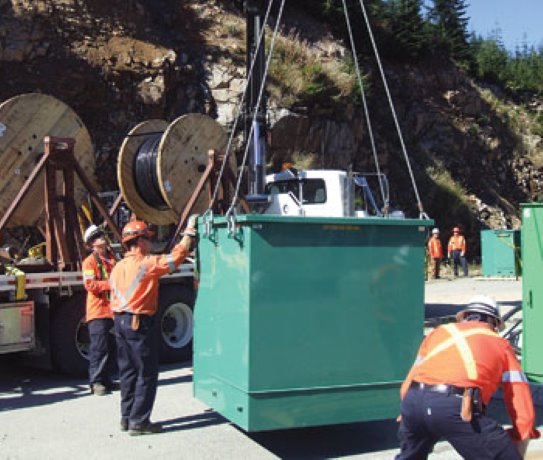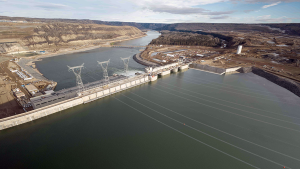BC Hydro has completed a consultation process with representatives of the construction industry to identify problems with their contracts and provide realistic incentives for contractors to undertake work for them.
BC Hydro has completed a consultation process with representatives of the construction industry to identify problems with their contracts and provide realistic incentives for contractors to undertake work for them.
“The new contract is light years ahead of the contract that was previously used by BC Hydro,” said Philip Hochstein, president of the Independent Contractors and Businesses Association (ICBA).
“The document is much more in line with standard construction contracts. BC Hydro will be test driving the document and putting out tenders to see how it works. The goal is to change BC Hydro from a customer of last resort to a customer of choice for the construction industry.”
The ICBA, the B.C. Construction Association (BCCA) and the B.C. Road Builders and Heavy Construction Association were invited last summer by BC Hydro to participate on a committee, which aimed to revamp the terms and conditions on the standard construction contract.
BC Hydro is using the committee to create a perception in the construction industry that they can work collaboratively with contractors, when putting out tenders and requests for proposals.
The previous BC Hydro contract was considered to be an “owner favoured” form of agreement.
It was perceived as being one-sided, unfair and onerous by some contractors.
“Regardless of what has happened in the past, the approach used by BC Hydro to engage industry in the redevelopment of the construction contract has been very productive,” said Manley McLachlan, president of the BCCA.
“It has been evident to us that BC Hydro wants to address concerns that were raised by the industry in the past.
“The process they used to get industry feedback has been well received by the BCCA.”
He said the discussion hasn’t produced the ideal contract, but it clearly represents an improvement.
“As part of the process to introduce the contract, BC Hydro is proposing to bench test the contract on a couple of projects and then they will engage industry for feedback on the practical elements,” he said.
BC Hydro and the committee began an overall review of construction industry associations and supplier groups in October 2011.
The committee, which included senior managers from generation and transmission, decided the contract should be the first priority.
This work finished on April 10.
“The general conditions and agreement that is part of the new bid package is largely complete,” said BC Hydro chief procurement officer Dan Olsen.
“The next step is to finish off the instructions or technical elements around the bid package. We expect to get a couple of bids out this spring using the new form. This will allow us to get real time feedback on the effectiveness of the contract.”
According to Olsen, the bench test of the new contract will give BC Hydro a chance to make sure everything is working correctly, before the use of the contract is scaled up for all their construction competitions for 2013.
“We are taking away some of the uncertainty in the existing contract, which removes additional risk premiums,” he said.
“One of the underlying principles of the new contract is that the party, who can best handle risk, will carry that risk. This means we have clarified some particular elements around schedule and work changes.”
The committee used the standard CCDC contract as a reference point for changes in the clauses and language of the new contract.
These changes will be announced through BC Bid, when the tenders are run in the spring, using the new documents.
“The specifications of the new contract are unique to BC Hydro, but the structure of the bid package will be familiar to all suppliers,” said Olsen.
“The new contract documents are much clearer and have more certainty about what happens once the contract is put into effect.”
BC Hydro recognizes the need to continue with this type of industry consultation on a regular basis.
Olsen said they expect to have two meetings a year to deal with changing market conditions and contracts.
“One of the good things about this whole process is we decided early on to get the document right for the future,” he said.
“We used our past problems as a learning opportunity and used experiences from both sides.
An example of an unfair conditions in the previous contract is that the “Hydro Representative” was responsible for interpreting the contract documents, reviewing progress draws and issuing work changes.
Under the CCDC and Canadian Construction Association standard form contract, these functions are normally handled by the consultant, who is hired by an owner.
They are expected to perform their roles independently from the owner and serve as an objective third party.
From the perspective of the contractor, the Hydro Representative had an irreconcilable conflict of interest between his role as a BC Hydro employee and his duty to act in a fair and impartial manner.
In addition, the previous BC Hydro contract did not provide compensation to the contractor for changes in the scope of work or schedule.
Instead, the contractor was involved in a process of negotiation relating to whether or not to grant compensation at all.
As a result, the previous contract placed full responsibility for ambiguity, conflict or error on the contractor, if they failed to report it immediately to the Hydro Representative.











Recent Comments
comments for this post are closed